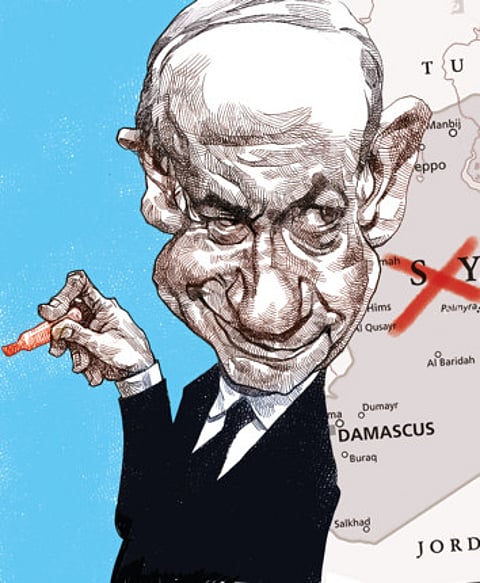Israel’s Syria red lines
Tel Aviv has deep-rooted anxiety driven by the fear that Iran and its proxies may try to establish a military presence on its borders

On April 27, Israel launched an air strike aimed at a Hezbollah arsenal and an aviation fuel depot near Damascus International Airport. The strike was the latest in a series of raids conducted by Israel to impose a set of “red lines” for the parties involved in the Syrian conflict. Specifically, the Israelis made it clear that they would not tolerate transferring advanced weapons — including air-defence systems, long-distance missiles, naval missiles and drones — to Hezbollah in Lebanon. Israel would not also allow the presence of pro-Iran militias in the vicinity of the occupied Golan Heights.
Israel has actively and aggressively enforced its “red lines” since January 2012. Russia’s military intervention in favour of the Syrian regime did not affect Israel’s calculations. On the contrary, Israel has closely coordinated its military movements in Syria with Moscow since September of 2015; when Russia started its military campaign in Syria. The two countries cooperate through a bilateral coordination committee, chaired by the Israeli chief-of-staff and the Commander of Russian forces in Syria. The committee works to ensure that Russian air-defence systems are not used against Israeli military jets flying over Syria, given that Moscow has accepted Israel’s right to strike at targets within Syria in order to protect its security interests.
Despite its free rein to strike in Syria at will, Israel remains vigilant, deeply troubled by the conflict. Its anxiety is mainly driven by the fear that Iran and its proxies may try to establish military presence on Israel’s borders. The Israelis also worry that a potential peace settlement in the Syrian conflict, brought about by United States-Russia conciliation, could end the six-year conflict without offering any tangible return for Israel. Tel Aviv is particularly seeking to win international, or at least US, recognition for its annexation of the Golan Heights.
Hawkish approach
To date, the administration of US President Donald Trump has yet to formulate a coherent strategy towards the Middle East, including Syria. A number of important features of what his foreign policy may include are becoming apparent, however. Most importantly, the Trump administration is likely to adopt a more hawkish approach towards Iran. Washington is clearly becoming less tolerant of Iran’s regional expansionism and its intervention in the affairs of Arab states.
Trump has already demonstrated his willingness to act against Iranian policies on the Syrian stage. Last month, the US retaliated to the use of Sarin nerve agent by the Syrian regime against civilians in the northern town of Khan Sheikhoun. The US response took the form of a cruise missile strike against the Shuyarat airfield from which the planes that attacked Khan Sheikhoun had taken off. Russia was pre-warned of the attack, but it was, nevertheless, a signal from the White House that it broke with the doctrine of former US president Barack Obama — and was prepared to use force to achieve its political ends.
This single action does not necessarily indicate a fundamental shift in Washington’s approach to the crisis in Syria, only that the US was committed to being involved in some way. The Trump administration, which continues to consider the war against Daesh (the self-proclaimed Islamic State of Iraq and the Levant) as its top Middle East priority, has not made clear the extent to which it will be willing to act against Iran in Syria or cooperate with Russia to find a settlement to the bloody Syrian conflict.
Leveraging connections
Regardless of what the Trump administration intends to do in Syria, it is clear that Israel will seek to further its own aims within Syria by leveraging its connections and influence in both the US and Russia. Israel will likely continue to impose its red lines in Syria and may even seek international backing for its claim to the occupied Syrian Golan Heights. Israel will also try its best to keep Iran away from its borders in the south of Syria.
On the Lebanese frontier, neither Israel nor Hezbollah have any interest in starting a direct military confrontation. A recent show of force by Hezbollah in the south of Lebanon could be viewed as mere publicity stunt and a psychological warfare; one intended to boost the morale of its domestic, Lebanese support base. For Israel, the only meaningful reality will be the extent to which Hezbollah abides by the 2006 ceasefire along the Lebanese frontier, regardless of the pounding it takes in Syria.
Dr Marwan Kabalan is a Syrian academic and writer.


